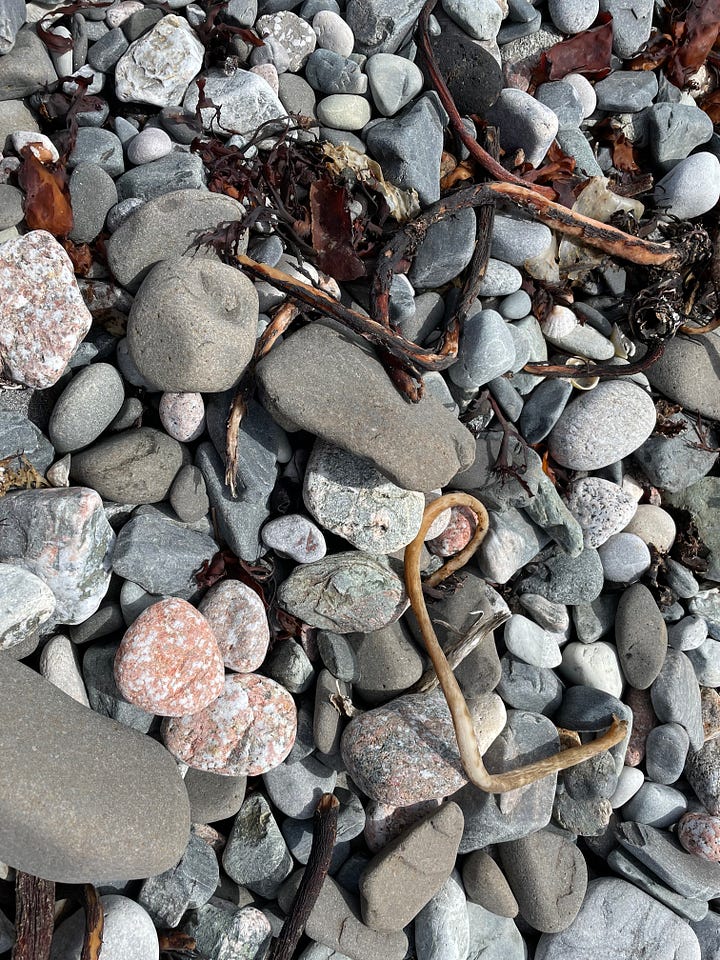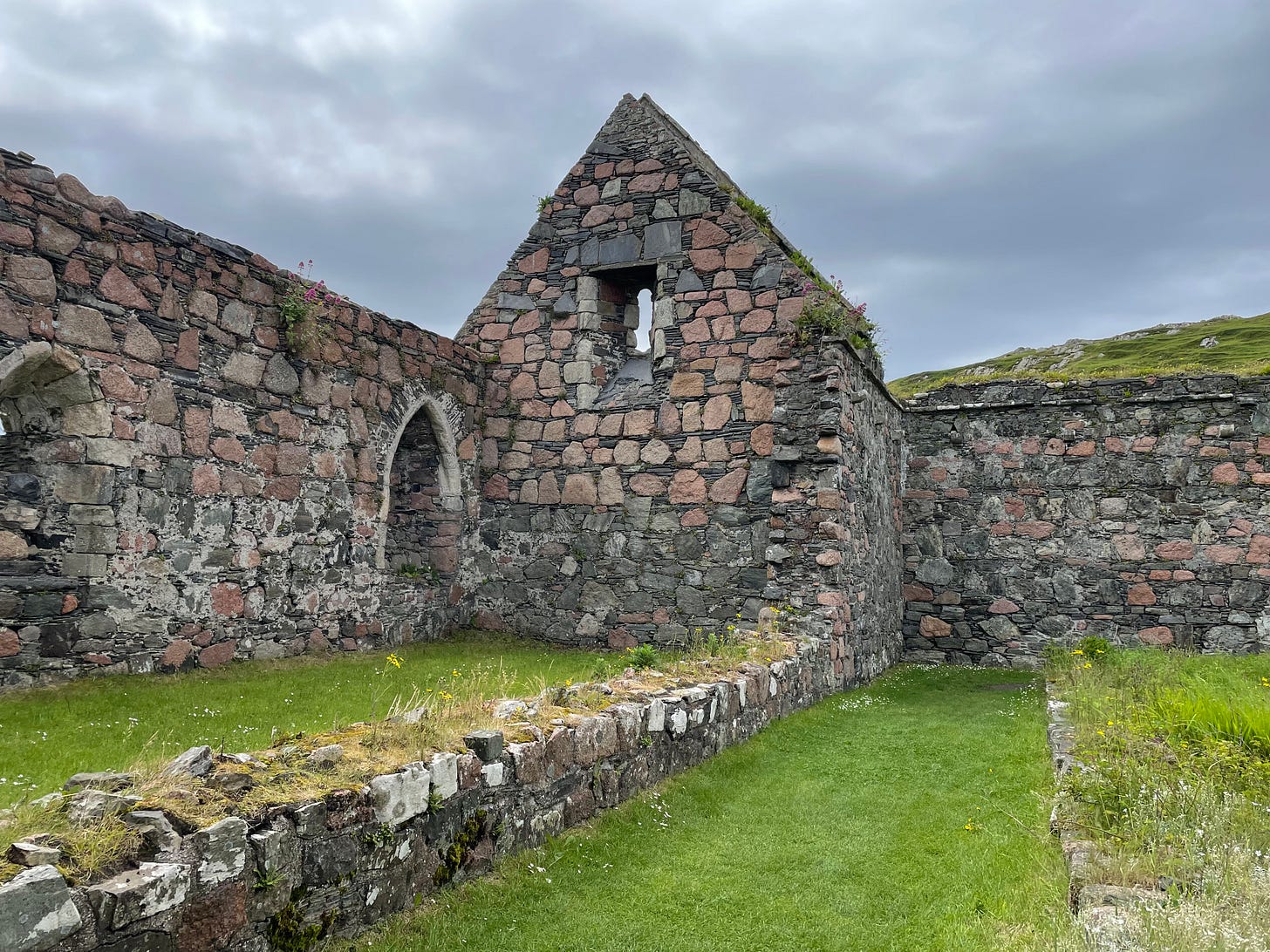The rain stopped late morning—perfect timing for our ferry ride across the Sound of Mull to the Isle of Iona.
I’d forgotten these silvery blues and greens. The ropes of kelp snaked across the rocks.


I first came to Iona at age 23 with my friend, Nan, after graduating college (pure possibility, unaware of how young I was). Then, nine years ago with Nico on our honeymoon (pre-kids, flush with new love). Now, we’re here with our kids for our first post-pandemic trip (43 now, a bit haggard).
Those younger versions of me are still on the island somewhere, too: walking lightly with a hiking backpack, staying at the hostel up the road, up too late drinking whiskey…getting lost on a hike in the rain, writing in a quiet corner of Iona Abbey, lying on the beach for an hour listening to the waves.
The kids crouch by the water scavenging for rocks and creatures and seaweed. They’re making Seashell Sandwiches, with limpet shells as bread and a crab claw for meat.
After another year of teaching and screens, I’m learning to look again: at my children, at my husband, at the world.
I lose sight of Kai behind some rocks on the shore. He appears again.
Together, we wander into Iona Nunnery on the way up the hill to the Abbey. Kai is in an intense mood, yelling at me to play his Monster Game. I’m worried that he’s bothering people who are reading the little plaques, gazing contemplatively at flowers growing in the pink granite walls. I’m not sure how quiet we’re supposed to be here.
I’m trying to read the plaque describing daily life for the nuns of this abbey, but I’m not taking in any words. Typical mom-on-edge, not able to relax in this beautiful space I’ve been waiting so long to see because I’m anticipating the fallout.
Then Kai is standing on the edge of a wall saying something excitedly and I’m not listening because my head is full of anxious calculating even though I said on the ferry ride over that my only agenda was “be present.” (ha!)
A voice cuts through my brain-fog: “That game sounds really cool.”
I half-turn toward the voice and say, “Yeah, thanks.” No idea what I’m saying thanks for, but Kai didn’t acknowledge him and someone probably should.
His energy turns aggressive. He’s a young-ish guy, wiry, messy hair. He steps forward, and says, “No, really, it sounds like life on earth.” He looks straight at me, and says, “Did you hear what he said?”
He waits for me to answer.
“Yes,” I say, with hollow certainty, like a kid pretending I heard what the teacher said even though I had absolutely no clue. My insides feel hot and mushy as I recite slowly back to him the bits I can vaguely remember: “The two of us are humans and there is only one monster…”
He cuts me off—“The humans are smart but powerless, and the monster isn’t smart but has powers. That sounds like our world, doesn’t it?”
“Yeah, I guess it does,” I say. I’m filled with rage.
Why exactly am I being lectured by this random guy when I just want to experience this historic site with my family?
“Your son is smart. You should encourage it.”
“Thank you,” I say, and turn my body to start up the path with Kai.
“No, really, encourage it,” he says in a sharp, patronizing tone, which I read as: you should actually listen to your kids, you idiot. What I feel in my body is: You're a bad mom.
I turn back toward him and really look at him for a moment. “I will,” with a tone of “Ok, get off my back.”
My head is ringing as I walk up the little hill toward the Abbey, Kai holding my hand, asking for a snack. I feel stung. Guilty for being called out on not listening to my son. Angry that here I am at Iona, a place I wasn’t sure I would ever get back to, that I’ve been longing to return to for nearly ten years, and I can’t even enjoy it because I need to manage my child, and now this scolding by this jerk for his limited perception of my parenting.
I do listen to my kids, I mumble under my breath. At least I try to.
I remember vividly from my own childhood how often adults would not listen to me or kind of half-listen. How they’d have that vacant veil over their face as I was telling a story, then once I paused, they’d snap back and say, “Really? Wow. Uh huh” in a particular tone that I knew meant they hadn’t heard a word I’d said. I hated it. I’ve never liked to be humored, although I’m now expert at humoring others. Giving a little laugh to the stranger’s bad joke, smiling at the random person on the street, even though I don’t feel like it.
As I’m fishing out a snack from my bag for Kai, I’m still raw. I don’t need to be mansplained by some guy that doesn’t have any kids, I think to myself.
I remember judging parents before I became one for not listening to their kids, for not taking what they said seriously. Then, I felt the onslaught of demands and questions directed toward me as a parent, and I learned that if I was going to maintain any kind of mental balance, I would have to tune some things out to hear my own thoughts.
And, while the aggressive jerk scolding me into being a better parent was off-base on many levels, he was also right. I wasn’t listening. But who wants to be scolded by someone else—especially so aggressively—to be present, to listen?
I think of the younger Emilys wandering this island somewhere. Younger me would have had a much easier time simply avoiding this guy, or giving a snappy reply and getting the hell away from him. Back then, I could move more nimbly in the world, literally and figuratively. And, I could quiet my mind enough to listen fully because I wasn’t being interrupted every few seconds.
What would it be like to listen fully again? To listen with my whole mind and my whole body. Not just listening as a waiting game—my own question or need ringing in my ears, drowning out the words and meanings someone is taking the time to share with me.
When I think back now on that moment, I feel more compassion for myself than I could access at the time. I was trying so hard—to be patient with Kai, to enjoy Iona, to listen to and affirm the stranger’s perspective. What about my own thoughts in the midst of all this?
How many times, and for how many years, have I suppressed my own sharp, necessary thoughts because of the need to affirm others? When I really listen to my own thoughts and questions I find that I can be more present to listen to others as well. It opens up space in my head to listen and not just hear—a space in which I can truly hear my child's voice and my own.
Be Where You Are is a newsletter about how to use writing and mindfulness to be where you are. I’ll be back on Tuesday with an interview with Jane McCafferty, a brilliant fiction and creative nonfiction writer, poet, professor, and one of my mindfulness heroes.
You’re always welcome to reply to this email, comment below, or find me on instagram (@mohnslate) or elsewhere. If you enjoyed this, I’d love it if you would subscribe, share this post, or send it to a friend.






What a beautiful place to bring your family!! I’m sorry you had this rough experience – I would guess that guy saw himself in your son and his words were really for his own mother, or someone else that hasn’t shared his love of gaming (or something else he geeks out on). He assumed he knew everything about you and your son by that tiny sliver of interaction, but of course he doesn’t. We will all have moments when our kids’ interests and ours don’t match and that might look to outsiders like we don’t care, but we know we do – and I would bet your son knows and feels it, too.
I think every mom can relate to this! I know I can. I love the image of the different Emilys walking around. Always so much mom guilt lurking - bet he would not have said that to a dad!